1 quoniam conj. because. quod, quia, and ... - The Latin Library
1 quoniam conj. because. quod, quia, and ... - The Latin Library
1 quoniam conj. because. quod, quia, and ... - The Latin Library
You also want an ePaper? Increase the reach of your titles
YUMPU automatically turns print PDFs into web optimized ePapers that Google loves.
1 <strong>quoniam</strong> <strong>conj</strong>. <strong>because</strong>. <strong>quod</strong>, <strong>quia</strong>, <strong>and</strong> <strong>quoniam</strong> take the indicative, when the reason is given on theauthority of the writer or speaker; the subjunctive, when the reason is given on the authority of another.geminus, -a, -um, double, twin. aetas, -atis f. age. verecundia, -ae f. decency, respect. discrimen, -inisn. interval; difference, importance; crisis.2 tutela, -ae f. care, protection, guardianship. locus, -i m./n. place. Recall that locus differentiates in theplural between physical locations (neuter) <strong>and</strong> abstract locations (i.e., passages in a book) (masculine).augurium, -i n. augury, divination. lego, -ere, legi, lectum, to read; select.3 condo, -ere, -didi, -ditum, to store up; establish (a city). Here conditam urbem. Palatium, -i n. thePalatine Hill. Aventinum, -i n. the Aventine Hill.4 inauguro (1) to practice augury; consecrate. templum, -i n. portion of the sky marked off for observationof auspices; temple.5 prior, prius, former, previous; first. fertur: “it is said” (a common meaning of feroin the passive).vultur, -uris m. vulture.6 duplex, -icis, two-fold, double. uterque, utraque, utrumque, each (of two). multitudo, -inis f.multitude, throng.7 consaluto (1) to greet, salute. praecipio, -ere, -cepi, -ceptum, to obtain in advance, anticipate; order,comm<strong>and</strong>.8 traho, -ere, traxi, tractum, to drag, haul; attract, appropriate; assume, acquire. inde adv. from there,thence; thereupon. altercatio, -ionis f. disupte, debate. congredior, -i, -gressus sum, to come together.certamen, -inis n. struggle, contest. ira, -ae f. wrath, anger. caedes, -is f. killing, slaughter, massacre.9 verto, -ere, -i, -sum, to turn. turba, -ae, throng, crowd; tumult, disturbance. ico, -ere, ici, ictum, to strike.cado, -ere, cecidi, casum, to fall. vulgatus, -a, -um, general, common, well-known. ludibrium, -i n.mockery.10 transilio, -ire, -ui, to leap across. murus, -i m. wall.11 increpito (1) to reproach, rebuke. adicio, -ere, -ieci, -iectum, to throw to; apply to; add. deinde adv.next, then. quicumque, whosoever. moenia, -orum n.pl. walls (of a city).12 interfectum = interfectum esse (from interficio, -ere, -feci, -fectum, to kill). <strong>The</strong> suppression of theauxiliary form of esse with passive verb forms is common. <strong>The</strong> infinitive continues the indirect speechconstruction. potitus = potitus est (from potior, -iri, -itus sum + abl. to gain possession of).13 appellata = appellata est (from appello, -are, -avi, -atum, to call).14 adeo . . . ut: “to such a degree that”. quilibet, quaelibet, <strong>quod</strong>libet, anyone, anything. finitimus, -a,-um, neighboring, adjacent. bello: ablative of respect.15 penuria, -ae f. want, lack. mulier, -eris f. woman. aetas, -atis f. age; lifetime. duro (1) to last, endure.magnitudo, -inis f. greatness.16 quippe quibus = “inasmuch as to them”. quippe qui is equivalent to a cum causal clause. domi: locative.spes, -ei f. hope. proles, -is f. offspring. conubium, -i n. right of marriage.17 consilium, -i n. deliberation; council; advice. legatus, -i m. envoy. vicinus, -a, um, neighboring. gens,gentis f. clan, stock, people, tribe, nation. qui: a relative clause of purpose. societas, -atis f. alliance,association.18 infimus, -a, -um, lowest (superlative of infernos).19 nascor, nasci, natus sum, to be born. <strong>The</strong> infinitive is in indirect speech, governed by peterent, as are theinfinitives in the following clauses. quas: i.e., urbes. di = dei. iuvo, -are, iuvi, iutum, to help; please.ops, opis f. power; wealth, resources.20 scio, -ire, -ivi, -itum, to know. origo, -inis f. origin, beginning. desum, -esse, -fui, to fail, be lacking.21 proinde, consequently, therefore. gravo (1) to burden, oppress, trouble. sanguis, -inis m. blood.22 genus, -eris n. birth, descent, origin, race, stock. misceo, -ere, -ui, mixtum, to mix, mingle. nusquamadv. no where. legatio, -ionis f. embassy. simul adv. at the same time. sperno, -ere, sprevi, spretum, toreject, scorn, despise.
23 moles, -is f. great mass; greatness, might, power. posterus, -a, -um, subsequent, following next; m.pl.posterity. metuo, -ere, -ui, -utum, to fear.24 plerique, -aeque, -aque, the greater number, most. rogito (1) to ask eagerly, pointedly. ecqui, ecquae,ec<strong>quod</strong>, is there any? Here ec<strong>quod</strong> modifies asylum.25 demum, at last, finally, in short; id demum: that <strong>and</strong> that alone. compar, -aris, equal. conubium, -i n.right of marriage. fore = futurum esse (an infinitive dependent on the implied indirect speech followingrogitantibus. aegre adv. with pain, regret, or difficulty. pubes, -is f. youth. patior, pati, passus sum, tobear, endure, suffer; allow. haud adv. hardly, not at all.26 dubie adv. doubtfully. haud dubie = certainly. vis f. force, vigor, strength, violence. coepi, coepisse,coeptum, to have begun. Recall that this verb occurs only in the perfect tenses.27 aegritudo, -inis f. sickness (especially of the mind). dissimulo (1) to disguise, keep secret, hide. ludus, -im. game; school. ex industria: intentionally, on purpose.28 equester, -tris, -tre, relating to horsemen, equestrian. sollemnis, -e, ceremonial, festive, religious; annual;usual, customary. Consualia; the festival of Consus, the Roman good of good counsel, was held annuallyon August 21. indico, -ere, -dixi, -dictum, to declare publicly, proclaim. finitimus, -a, -um, neighboring,adjacent. Here used as a substantive: “the neighboring peoples”.29 iubeo, -ere, iussi, iussum, to order. apparatus, -us m. preparation; tool, engine; splendor. concelebro (1)to celebrate; pursue eagerly; praise.31 convenere = convenerunt. studium, -i m. eagerness, zeal. videndae: gerundive modifying novae urbis.32 proximi quique: “especially the nearest”. quisque is used idiomatically with a superlative or an ordinalnumber to express “all of” or “especially”.33 coniunx, iugis c. spouse, mate. hospitaliter adv. hospitably, graciously.34 situs, -us m. location, site. moenia, -orum n.pl. city walls. frequens, -entis, crowded, full. tectum, -i n.roof; house.35 brevi = brevi tempore. cresco, -ere, crevi, cretum, to grow, increase. deditae: read with erant to formthe pluperfect passive. eo: spectaculum.36 ex composito: by agreement, on purpose. orta = orta est, from orior, oriri, ortus sum, to arise. iuventus,-tutis f. youth, young people.37 discurro, -ere, -(cu)curri, -cursum, to run in different directions, run about. forte adv. by chance.quaeque: each.38 incido, -ere, -cidi, -casum, to fall into; fall in with, meet. raptae = raptae sunt. forma, -ae f. shape,beauty. excellens, -entis, outst<strong>and</strong>ing, distinguished. primoris, -e adj. first, chief. Here used as asubstantive. destino (1) to fix, determine; choose; designate as a wife.39 plebs, plebis f. the common people. negotium, -i n. business, task, undertaking. defero, -ferre, -tuli,-latum, to carry away, carry off.


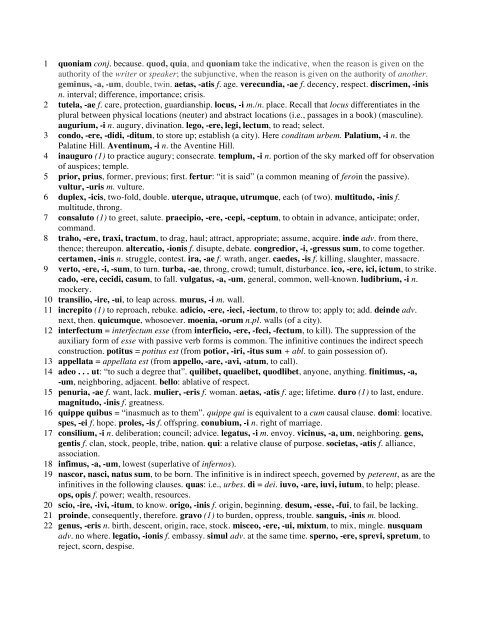
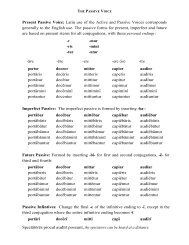
![[10] Victoriae Romanae fama cum pervasisset in ... - The Latin Library](https://img.yumpu.com/49871968/1/190x245/10-victoriae-romanae-fama-cum-pervasisset-in-the-latin-library.jpg?quality=85)
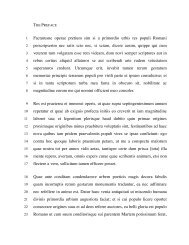
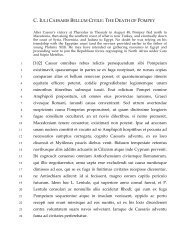

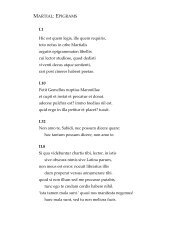
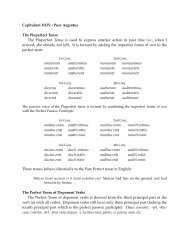
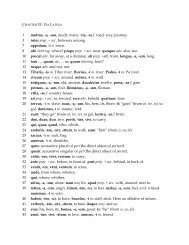
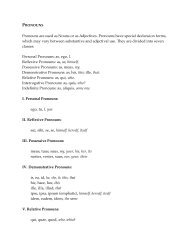
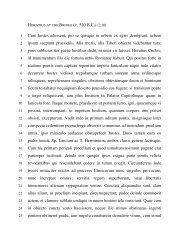
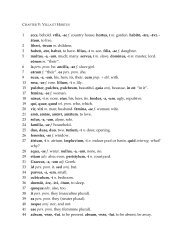
![[17] Nosti quendam Barbarum nostrae civitatis ... - The Latin Library](https://img.yumpu.com/45799776/1/190x245/17-nosti-quendam-barbarum-nostrae-civitatis-the-latin-library.jpg?quality=85)

